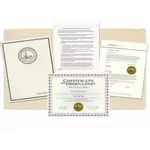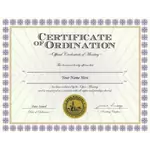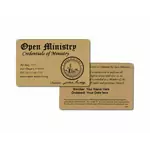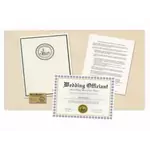Information on How to Get Ordained and Register as a Minister
How to get ordained and perform a wedding or ceremony in Oregon.
Since 2010, Open Ministry has been ordaining and helping people all over the world perform weddings, ceremony and other sacerdotal duties. This page focuses on requirements and information for Oregon, if you don't need the States Statues or ordination information for Oregon scroll down to the bottom of the page for links to other states.
Let's get started with the information for Oregon
If you are planning to get ordained in Oregon or you have been asked to perform a wedding ceremony in Oregon, or simply need to to find a minister in Oregon to perform your wedding ceremony the information on this page will assist you. If you still have questions we invite you to visit our FAQ or contact us for more detailed information. We are here to help and support our ministers and congregation.
Registered Ministers with Open Ministry have successfully performed thousands of marriages in Oregon and around the world!
The Ordination and Officiant information is provided below in an easy five step layout which is designed help walk you through the most common steps on registering to become a minister for Oregon and how perform a wedding ceremony in Oregon.
Step 1 - How to Become Ordained
How to get Ordained in Oregon and become a minister to perform weddings and marriage ceremonies in Oregon
Ordinations for Oregon are completely free and can normally be completed in less than a day. Thousands of people have registered and became licensed ministers in Oregon. Once you have completed the ordination process you are able perform marriages through Open Ministry in and for the state of Oregon!
Become Ordained for free and start your journey as an authorized minister in Oregon with Open Ministry.
Get started today by clicking on the link below!
Step 2 - Contact The County Clerk
How to Register to Officiate a Marriage in Oregon
Next, contact the office of your local marriage authority (typically your county clerk in Oregon). Let them know that you are a ordained minister with Open Ministry in California, and ask them what information the will require of you, to officiate a marriage in Oregon. Most clerks and governing agencies may require that you present them with a physical copy of your ordination record.
When speaking with the county clerk; it can be helpful to use the following phrases.
- What agency or department issues marriage licenses in your county and how may I contact them?
- I am an ordained minister with a church in California and I would like to register as a wedding Officiant in your county to perform and solemnize weddings.
- I have my Letter of Good Standing and/or Ordination Credential as proof of my ministry and ordination.
- What additional documentation is required for me to register as a wedding Officiant in your county or state?
Step 3 - Getting Licensed to Perform the Marriage
License to perform a wedding in Oregon
After you've contacted your marriage authority, you will want to visit our bookstore to get physical copies official credentials for presentation and your records. (See Oregon State Statutes for More Specific Requirements )
When registering in Oregon you may be asked to display proof of your ordination to the county clerk's before they will accept the marriage license as having been legally solemnized. We typically advise ministers of Oregon to get a Complete Minister Package for Oregon which includes your Letter of Good Standing (the live signed and notarized physical copy of your standing with our ministry).
Having your physical copies credentials provides peace-of-mind to couples and others that you intend to marry. Additionally, we recommend at least 4 weeks between the date of the wedding ceremony and your order, to ensure that you receive all of your materials and are able to register in time. Please note that every state and county can impose different requirements. This may include other nominal fees and additional paperwork that may need to be completed before the ceremony can take place.
It is important to note that some county clerks in Oregon may require wedding officiants to attach a statement which asserts some of the elements in the marriage license upon submission, including the following:
- The time and location at which the wedding took place
- The names and places of residence of all official witnesses
- The religious organization in which the officiant is ordained
- The printed name and address of the officiant
Please note that, when filling out a marriage license, that Oregon State may request you use the title "Minister" or "Reverend". The County Clerks may also require you enter your denomination, you can use "Non-Denominational". Failing to state a denomination may result in rejection and could require a duplicate marriage license.
Step 4 - How to Perform the Wedding
How to perform a wedding in Oregon
Once you have completed of the above, you are ready to perform the wedding! Be sure that the couple has picked up their Oregon state issued marriage license from the appropriate office. Oregon marriage licenses valid for a set number of days, and there may be a waiting period between when the couple receives the marriage license in Oregon and when the ceremony may be legally performed in Oregon. This information should be written on the license and followed to ensure the ceremony is recorded properly.
Please be aware that the signed license must be returned to the issuing office in Oregon before the time limit is reached. Check the marriage license for the exact dates. Once the the previous matters have been addressed, officiating a wedding in Oregon can be a great and wonderful experience.
If you have any comments or issues as a wedding officiant in Oregon, or after you have been ordained, or would like to just asking for guidance on how to perform a wedding ceremony in Oregon. We recommend that all new Oregon wedding ministers who have issues or concerns about the ceremony read over our helpful guides.
Oregon
106.120 Who may solemnize marriage; fee; personal payment; records
(1) As used in this section, "judicial officer" means:
(a) A judicial officer of this state as that term is defined in ORS 1.210 and includes but is not limited to a judge of a municipal court and a justice of the peace.
(b) An active judge of a federal court.
(c) An active United States magistrate judge.
(2) Marriages may be solemnized by:
(a) A judicial officer;
(b) A county clerk;
(c) Religious congregations or organizations as indicated in ORS 106.150 (2); or
(d) A clergyperson of any religious congregation or organization who is authorized by the congregation or organization to solemnize marriages.
(3) A person authorized to solemnize marriages under subsection (2) of this section may solemnize a marriage anywhere in this state.
(4)(a) When a marriage is solemnized by a tax, appellate or circuit judge of this state, the clerk of the court or the county clerk shall collect a fee of $25 and deposit the fee in the Judicial Department Operating Account established in ORS 1.009.
(b) When a marriage is solemnized by a county clerk, the county clerk shall collect a fee of $25, as provided in ORS 205.320.
(c) The fee described in this subsection may be collected only if:
(A) The marriage is solemnized during normal working hours, excluding holidays;
(B) The marriage is solemnized in court facilities or a county clerk's office; or
(C) More than a minimal amount of staff time or other court or county clerk's office resources are used in connection with the solemnization.
(d) The Chief Justice of the Supreme Court or the county clerk may establish a written procedure for waiver of the fee required under this subsection in exigent circumstances, including but not limited to indigency of the parties to the marriage.
(5) In addition to any fee collected under subsection (4) of this section, a judicial officer of this state and a county clerk may charge and accept an agreed upon personal payment not to exceed $100 plus actual costs for the solemnization of a marriage if that solemnization is performed:
(a) At a place other than the courthouse where the judicial officer or county clerk serves; or
(b) Outside of the judicial officer's or county clerk's normal working hours.
(6) The charging and accepting of a personal payment by a judicial officer of this state or a county clerk under subsection (5) of this section does not constitute a violation of any of the provisions of ORS chapter 244.
(7) The amount of actual costs charged by a judicial officer of this state or a county clerk under subsection (5) of this section may not exceed:
(a) Actual expenses for food and lodging as verified by receipts.
(b) If travel is made by personal vehicle, the actual number of round-trip miles from the judicial officer's or county clerk's home or office, whichever is greater, compensated at the rate of reimbursement then provided by the State of Oregon to its employees or, if travel is made by a commercial carrier, reimbursement shall be made of the actual costs thereof, verified by receipts.
(8) A judicial officer of this state or a county clerk shall maintain records of the amount of personal payments received for performing marriages, of actual costs and the supporting documentation related thereto for a period of four years.
(9) The parties to a marriage solemnized by a tax, appellate or circuit judge of this state shall show to the judge proof of payment of the fee required under subsection (4)(a) of this section before solemnization. Except as provided in subsection (4)(d) of this section, the judge may not solemnize a marriage without proof of payment of the fee.
Volume 3 - Title 11: Domestic Relations - Chapter 106: Marriage
[Amended by 1971 c.621 §22; 1975 c.607 §22; 1977 c.518 §2; 1979 c.724 §3; 1979 c.833 §24; 1981 c.176 §1; 1991 c.282 §1; 1991 c.458 §1; 1997 c.424 §1; 1999 c.776 §1; 2001 c.501 §1; 2003 c.565 §1; 2003 c.737 §111]












